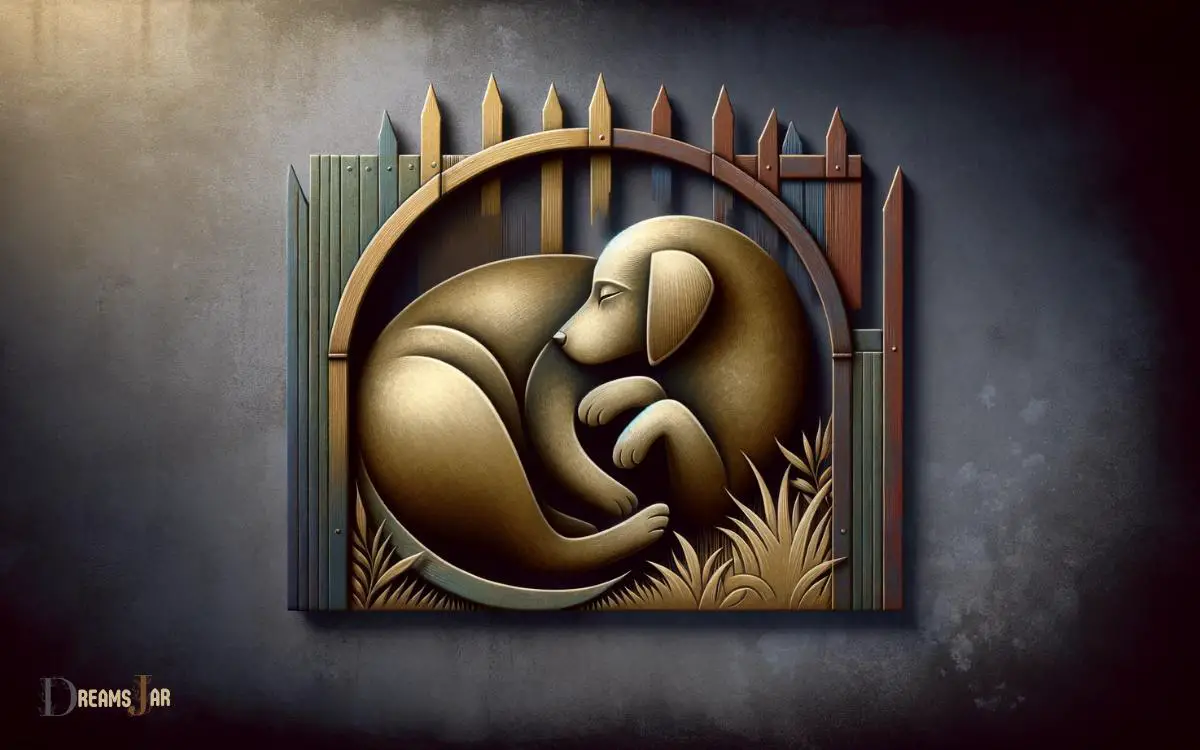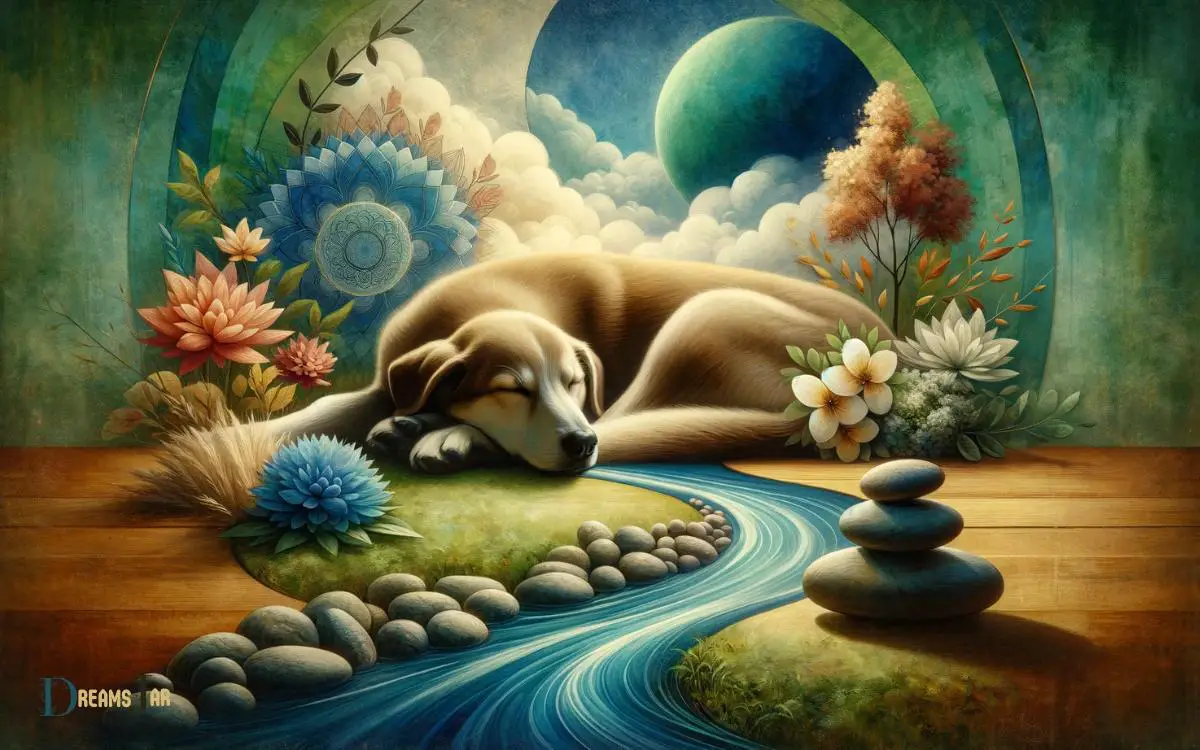What Does It Mean to Dream of a Sleeping Dog? Loyalty!
Dreaming of a sleeping dog typically symbolizes tranquility, loyalty, protection, and the presence of a faithful companion in your life.
This dream can indicate your inner peace and trust in your relationships, while also acting as a warning sign of potential threats.
In dream interpretation, the sleeping dog is a common symbol with profound meanings. Dreaming of a sleeping dog is often associated with feelings of peace and tranquility, signifying contentment in life.
It can also symbolize loyalty, reflecting the trust and faithfulness inherent in your relationships. However, it can also serve as a subtle warning of potential threats or dangers lurking beneath the surface.
For example, the dog might suddenly wake up and start barking in your dream, indicating a hidden threat.
In essence, dreaming of a sleeping dog is a symbolic reflection of your emotional state, relationships, and awareness of potential dangers.

Key Takeaway
The Symbolism of a Sleeping Dog
The symbolism of a sleeping dog can be interpreted as a sign of tranquility and contentment.

- When a dog is peacefully asleep, it signifies a state of inner calm and harmony. Dogs are known for their loyalty and protective nature, and when they are asleep, it suggests that they feel safe and secure in their surroundings.
- This symbolism can be extended to our own lives, as dreaming of a sleeping dog may indicate that we are experiencing a period of peace and contentment in our waking life.
- It can serve as a reminder to find moments of stillness and relaxation amidst the chaos of everyday life.
Just as a sleeping dog finds solace in sleep, we too can find solace in moments of tranquility and contentment.
Unconscious Desires and Emotions
Continuing with the exploration of the symbolism of a sleeping dog, the dream can also provide insight into our unconscious desires and emotions.

Dreams are often seen as the gateway to our innermost thoughts and feelings, and the image of a sleeping dog can be a powerful symbol in this context.
Here are three ways in which a dream of a sleeping dog can reveal our hidden desires and emotions:
- Security and protection: The presence of a sleeping dog may indicate a deep longing for security and protection in our lives. It could represent our desire for a sense of safety and stability.
- Loyalty and companionship: A sleeping dog can also symbolize our need for loyalty and companionship. It may reflect our longing for deep connections and meaningful relationships.
- Rest and relaxation: Seeing a sleeping dog in a dream could suggest our unconscious desire for rest and relaxation. It may be a sign that we need to take a break and recharge our energy.
Inner Peace and Contentment
Exploring the symbolism of a sleeping dog in dreams can provide insight into achieving inner peace and contentment.

- In the realm of dreams, a sleeping dog represents a state of serenity, tranquility, and emotional stability.
- Just as a sleeping dog is at peace with itself and its surroundings, so too can we find inner peace and contentment by embracing these qualities within ourselves.
When we dream of a sleeping dog, it is a reminder to seek balance and harmony in our lives, to let go of stress and worry, and to cultivate a sense of acceptance and calm.
Guarding and Protecting Your Personal Space
Just as a sleeping dog is alert and ready to spring into action when necessary, we too must be aware of our surroundings and prepared to defend ourselves if our boundaries are threatened.

However, it is important to differentiate between an intruder and an ally, and trusting our instincts can help us determine who poses a genuine threat and who can be trusted within our personal space.
Boundaries and Self-Defense
Guarding and protecting your personal space can be achieved by establishing clear boundaries and practicing self-defense techniques.
- By setting boundaries, you define what is acceptable and what is not, allowing you to assert your needs and protect your personal space.
- Self-defense techniques empower you to stand up for yourself and create a sense of security.
By understanding and implementing these strategies, you can effectively guard and protect your personal space, creating a safe haven for yourself.
Intruder or Ally
When considering the concept of guarding and protecting your personal space, it is essential to determine whether an individual’s presence in your personal space is that of an intruder or an ally.
- In this context, an intruder represents someone who poses a threat to your well-being, while an ally symbolizes someone who offers protection and support.
- Personal space is a sacred realm that allows us to feel secure and comfortable. It serves as a psychological boundary that shields us from external influences.
- Identifying whether an individual is an intruder or an ally is crucial in maintaining this sense of security.
- An intruder may invade our personal space, violating our boundaries and causing us distress. On the other hand, an ally respects our personal space and acts as a shield, safeguarding our emotional and physical well-being.
Understanding the intentions of others and discerning between intruders and allies is essential for maintaining a healthy personal space.
Trusting Your Instincts
Trusting your instincts is crucial for effectively guarding and protecting your personal space. It is a skill that allows you to navigate through the complexities of life with clarity and confidence.
Just like a sleeping dog, your instincts serve as a powerful guardian, guiding you towards safety and alerting you of potential dangers.
Here are three key reasons why trusting your instincts is essential:
- Intuition: Your instincts are a manifestation of your subconscious mind, picking up on subtle cues and patterns that your conscious mind may overlook. By trusting your intuition, you can make informed decisions and avoid harmful situations.
- Self-preservation: Your instincts act as a natural defense mechanism, helping you recognize threats and protect yourself from harm. They serve as a reminder to prioritize your well-being and establish healthy boundaries.
- Authenticity: Trusting your instincts allows you to stay true to yourself and your values. It helps you discern between genuine connections and manipulative influences, enabling you to cultivate relationships that align with your authentic self.
Trusting your instincts is not only vital for guarding and protecting your personal space but also for fostering loyalty and trust in relationships.
Loyalty and Trust in Relationships

Building Strong Relationship Foundations
To establish a solid foundation in a relationship, it is crucial to foster a deep sense of trust and unwavering commitment.
- Trust forms the cornerstone of any successful relationship, as it allows partners to feel secure, vulnerable, and open with one another. Without trust, doubts and insecurities can erode the connection between two individuals.
- Alongside trust, loyalty is another vital component in building strong relationship foundations.
- Loyalty signifies the dedication and faithfulness partners have towards each other, creating a sense of reliability and dependability.
- Furthermore, effective communication acts as a bridge that connects partners, providing a platform for understanding, empathy, and problem-solving.
Communication allows for the expression of emotions, needs, and desires, fostering a deeper connection and strengthening the bonds of a relationship.
Importance of Mutual Trust
A strong and enduring relationship hinges on the foundation of mutual trust, an intangible quality that acts as the bedrock for loyalty and commitment.
- Mutual trust forms the basis of a healthy and thriving partnership, allowing individuals to feel secure, supported, and valued.
- It is a delicate balance of reliance and vulnerability, where both parties have confidence in each other’s intentions and actions.
- Trust enables partners to be transparent and authentic, fostering open communication and emotional intimacy.
- It creates a sense of safety, allowing individuals to express their true selves without fear of judgment or betrayal.
- Mutual trust also cultivates loyalty, as it strengthens the bond between partners and encourages them to prioritize each other’s needs and well-being. Without trust, a relationship becomes fragile and susceptible to doubt and insecurity.
Therefore, nurturing and maintaining mutual trust is essential for building a solid foundation of loyalty and commitment in any relationship.
Warning of Potential Danger or Threats
Sleeping dogs in dreams can serve as a harbinger, alerting individuals to potential dangers or threats.
These dreams, although seemingly innocuous, carry a deeper symbolic meaning that can provide valuable insights into one’s waking life.

When a sleeping dog appears in a dream, it may indicate the presence of hidden dangers or imminent threats that the dreamer should be aware of.
This warning can manifest in various forms, such as:
- A sense of uneasiness or discomfort
- Intuition or gut feeling
- Symbolic representations, such as dark shadows or ominous figures
Healing and Restoring Balance in Life
When considering the deeper meanings behind dreaming of a sleeping dog, one must also explore the potential for healing and restoring balance in life.

- Just as the dog represents loyalty and companionship, the act of sleeping symbolizes a state of rest and rejuvenation.
- In dreams, the sleeping dog may serve as a reminder to prioritize self-care and seek inner healing. It signifies the need to find solace and restore balance in one’s life.
- This symbolism suggests that by taking the time to rest and recharge, individuals can regain their strength and foster a sense of harmony and equilibrium.
It is a call to address any imbalances or wounds that may exist within oneself, ultimately leading to a restored sense of wholeness and well-being.
Conclusion
This dream signifies the importance of understanding and acknowledging our subconscious thoughts and emotions.
It also emphasizes the need to prioritize our well-being and protect ourselves from potential threats.
By interpreting and analyzing such dreams, we can gain valuable insights into our own psyche. This, in turn, allows us to navigate our lives with greater awareness and understanding.






